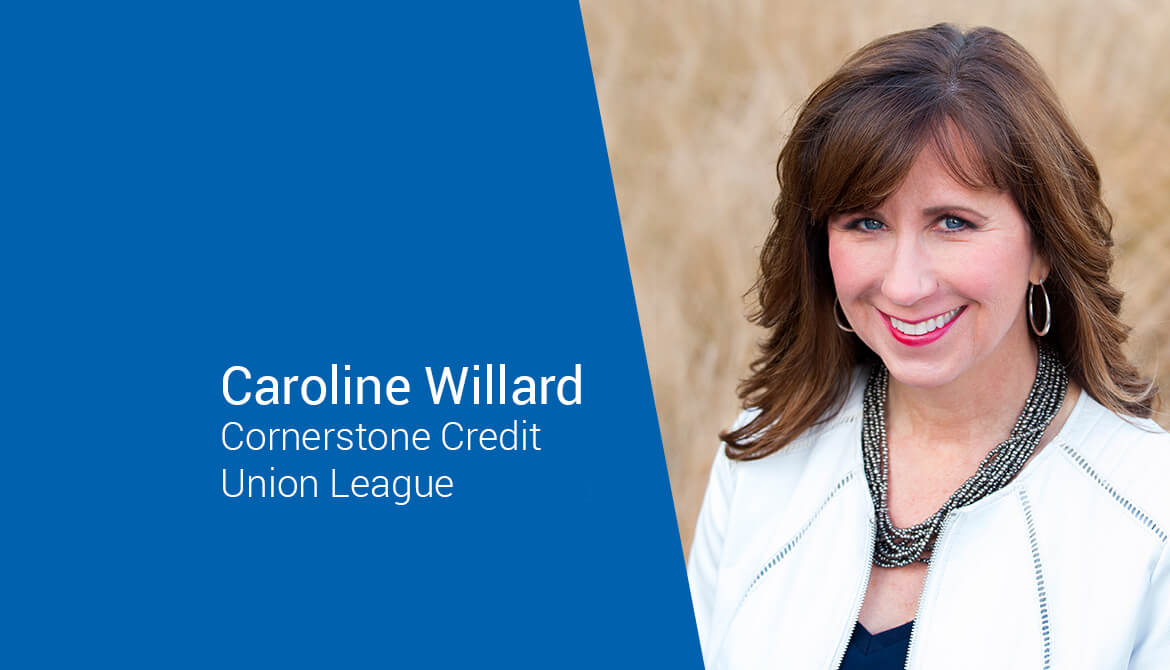4 minutes
Caroline Willard, CCE
President/CEO
Cornerstone Credit Union League
Plano, Texas
cornerstoneleague.coop
What leadership techniques did you apply to helping Texas credit unions respond to and recover from Hurricane Harvey?
I appointed a seasoned leader (CFO Karen Hart, CUDE) to be the pivot point for our response efforts. This allowed us to make quick decisions in a rapidly evolving situation. If I had tried to control our every move, it would have slowed us down.
When attending the initial response team meetings, I had to learn to listen to the specific contributions each team member had to offer. They had been through this before, and I had not, so we eventually got into a rhythm of group brainstorming, followed by my encouragement to take the solutions to the next level. For example, we were providing branch open/closed status on our website, but I encouraged the team to ask our business partners if they could provide a better solution. In the end, [CUES Supplier members] CO-OP [Financial Services, Rancho Cucamonga, Calif.,] and PSCU [based in St. Petersburg, Fla.,] partnered to provide a member call center to provide real-time open/closed statuses. This will be an enduring asset that the movement can use during future crises.
I reminded the group to stick as close to our core competencies as possible. For example, at one point, the city of Beaumont was without drinking water, and our first reaction was that we should travel down there with a truck full of bottled water. When we stopped and thought about it, doing that would have distracted our response team from doing what it does best, which is acting as a hub for communications and resource matchmaking. (Incidentally, since there was a gasoline shortage in the DFW metro area and flooding in the streets of Beaumont, it might have also become a bit dangerous to send our employees on this type of rescue mission.)
Several of us used social media to ask for help, and then it just poured in. This was a powerful reminder of the strength of our movement. It also emboldened me to ask for more help!
What would you do differently in a future weather crisis situation?
Define the mission earlier. In the beginning, the people-helping-people culture within the league led to us spreading ourselves too thin. In the future, we can define the scope of our response more quickly so that we deliver on those efforts especially well.
How would you apply what you learned to a different kind of crisis?
It’s important to quickly assess the relevant experience that each team member has with a given scenario. I would hope that I will remember this, rather than assuming that I know what a team member has to offer based solely on his/her current job responsibilities. For example, one of our advocacy staff members had volunteered in his community during previous natural disasters, so he knew how to interact with various government agencies.
What did you learn from the hurricane response effort that you could apply to day-to-day leadership of your organization?
I learned that decision-making needs to be decentralized and that people at every level need to feel empowered to make the decisions that are within their scope of expertise. Good team members really want to do the right thing, and freeing them up to flex that muscle makes for a better end result.
Who do you think of as your mentors? What have they taught you?
I worked for Stan Hollen (former CEO of CO-OP Financial Services) longer than any other boss, and he taught me to have a heightened sense of urgency. Windows of opportunity close quickly: There is a golden moment for both disaster response and for new business opportunities, and if you don’t seize those moments, you can become irrelevant.
Having attended CUES’ CEO Institute, I received some part-time mentoring from the outstanding professors within that program. In particular, Kathleen O’Connor (associate professor of management and organizations at the S. C. Johnson Graduate School of Management, Cornell University, a visiting faculty member at the London Business School and a lead faculty member for CUES’ CEO Institute II: Organizational Effectiveness) taught me that, when you’re negotiating, you need to be tough on the issue but soft on the person. We can treat others with kindness and still be effective leaders.
What else helped make you the leader you are today?
Somewhere along the way, I lost my fear of asking a dumb question. When we stop posturing and start listening and questioning, we open up a whole host of opportunities. I wouldn’t have been able to do this had I not had some great executive coaching earlier in my career. That coach also taught me how to take the egos out of a conversation so that a more authentic exchange could happen. Today, it’s a lot easier to admit that I don’t know something and to ask for help than it would have been without her help.





